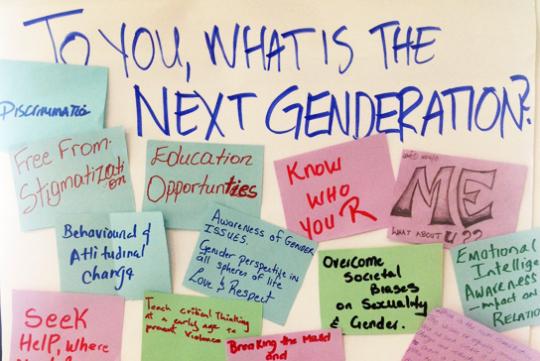
“Death…" that is the first word that comes to mind to some young Jamaican women that participated in a focus group on gender when they heard the word "man".
What makes a young woman attach such negative values to the other gender?
In Jamaica, where 20 % of the youth is considered unattached, excluded from the economic activity and society, violence among young people is a serious development issue. Last year, 218 young males, from 16-25 years old, were arrested for murder compared to only 3 females. Of the 4040 juveniles appearing before the local Courts, 75% were males. “Shifting norms and behavior on the issue of violence in Jamaica cannot successfully take place outside of the gender perspective”, said Senator Sandrea Falconer, Minister without portfolio, responsible for information, in the Office of the Prime Minister.
"There's an urgent need for change. More should be done,” Dwayne Gutzmer, 30 years old, told me. He participated with other young people and grass root organizations representatives at the launch of the "Next GENDERation" initiative in Montego Bay and Kingston.
World Bank experts agree with Gutzmer, they also have identified that awareness campaigns aimed at men, women, and youth constitute a promising approach to shift social norms based on gender stereotypes that influence the behavior and acceptance of violence.
The new “Next GENDERation” Initiative was designed by my colleagues Federica Marzo and Jonna Lundwall, in partnership with the Government of Jamaica and the Inter-American Development Bank, and it focuses on youth violence and its prevention by promoting behavioral change among the youth.
The campaign bases their success on the participation support and commitment of young people, tomorrow’s agents of change. This is why we want to work with and for young women and men in an innovative and creative way.
To launch the Initiative, we engaged young people from the National Center for Youth Development (NCYD) and other active members of civil society organizations, including local celebrities such as Emprezz Golding (TV anchor and entrepreneur) and Kemesha Kelly (youth ambassador for the “Vision 2030: Jamaica” campaign).
Apart from discussing the importance of gender equality when it comes to social and economic development, the participants were asked to identify and develop appropriate messages against targeting the social norms that allow for a high level of acceptance of violent behavior.These messages, that resonate with young Jamaicans, will be further developed and validated and could be used by the Government of Jamaica and its partners in relevant national communication campaigns.
In groups of 10, participants were first given scenarios describing potentially violent situations. With the guidance of social communication expert Audrey Cole-Crosdale, they were asked to come up with a plan to get out of the crisis situations, showing that violence is not the only way.
Be it a young man facing domestic violence or bullying in school, a woman who is a victim of sexual violence, or a young girl who is an outcast, the hypothetical situations created by Audrey and the team particularly resonated with the participants. The sometimes-heated debates between participants clearly indicated that many of them had already experienced such situations.
So what are some solutions to avoid violence?
Everyone agrees that improving communication, respecting the other person, having a mediator facilitating dialogue, and establishing partnership and reciprocal support between spouses are all ways to define the “Next Genderation.”
Then based on these role-plays, the groups had then to create the first messages and submit them to the vote of all the attendants. In total, 30 messages were drafted, and they couldbe organized in three broad categories of principles to promote to change the social norms that allow for a high level of acceptance of violent behavior:
- Communication and understanding
- Respect and self-awareness
- Partnership and solidarity
It’s also linking this campaign with another World Bank’s initiative, KingstOOn, that gathered on June 20-21 in Kingston, Jamaican businesses, animation professionals and amateurs, students and young dreamers to animate Jamaican creativity and create innovative cartoons. Some of that talent can also be used to promote the Next GENDERation campaign.
In the future, there could also be an artistic contest, an annual march in the main cities of the country, a TV and radio series… The steering committee is open to your propositions. Tell us what you would like the Next GENDERation to be.


Join the Conversation